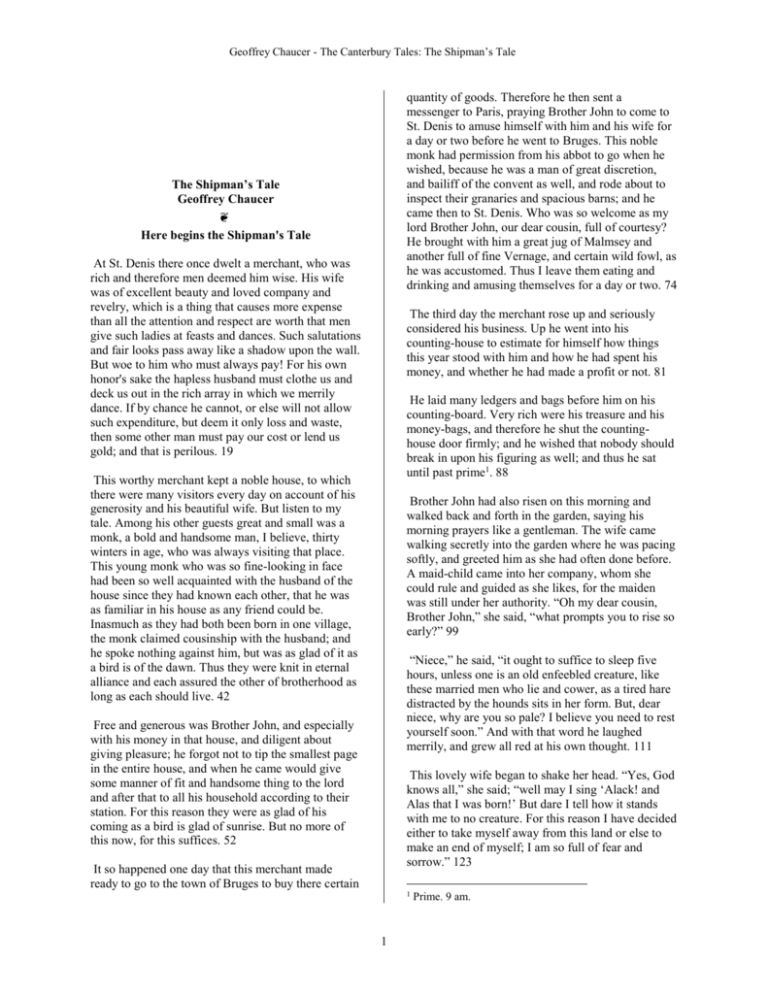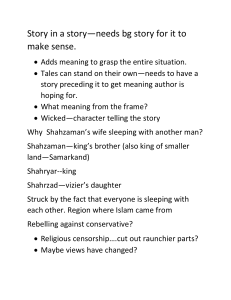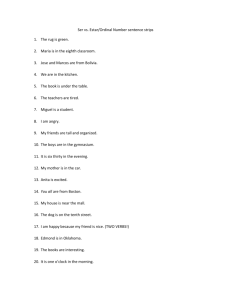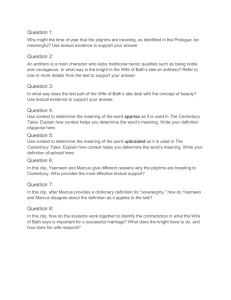
Geoffrey Chaucer - The Canterbury Tales: The Shipman’s Tale
quantity of goods. Therefore he then sent a
messenger to Paris, praying Brother John to come to
St. Denis to amuse himself with him and his wife for
a day or two before he went to Bruges. This noble
monk had permission from his abbot to go when he
wished, because he was a man of great discretion,
and bailiff of the convent as well, and rode about to
inspect their granaries and spacious barns; and he
came then to St. Denis. Who was so welcome as my
lord Brother John, our dear cousin, full of courtesy?
He brought with him a great jug of Malmsey and
another full of fine Vernage, and certain wild fowl, as
he was accustomed. Thus I leave them eating and
drinking and amusing themselves for a day or two. 74
The Shipman’s Tale
Geoffrey Chaucer
❦
Here begins the Shipman's Tale
At St. Denis there once dwelt a merchant, who was
rich and therefore men deemed him wise. His wife
was of excellent beauty and loved company and
revelry, which is a thing that causes more expense
than all the attention and respect are worth that men
give such ladies at feasts and dances. Such salutations
and fair looks pass away like a shadow upon the wall.
But woe to him who must always pay! For his own
honor's sake the hapless husband must clothe us and
deck us out in the rich array in which we merrily
dance. If by chance he cannot, or else will not allow
such expenditure, but deem it only loss and waste,
then some other man must pay our cost or lend us
gold; and that is perilous. 19
The third day the merchant rose up and seriously
considered his business. Up he went into his
counting-house to estimate for himself how things
this year stood with him and how he had spent his
money, and whether he had made a profit or not. 81
He laid many ledgers and bags before him on his
counting-board. Very rich were his treasure and his
money-bags, and therefore he shut the countinghouse door firmly; and he wished that nobody should
break in upon his figuring as well; and thus he sat
until past prime1. 88
This worthy merchant kept a noble house, to which
there were many visitors every day on account of his
generosity and his beautiful wife. But listen to my
tale. Among his other guests great and small was a
monk, a bold and handsome man, I believe, thirty
winters in age, who was always visiting that place.
This young monk who was so fine-looking in face
had been so well acquainted with the husband of the
house since they had known each other, that he was
as familiar in his house as any friend could be.
Inasmuch as they had both been born in one village,
the monk claimed cousinship with the husband; and
he spoke nothing against him, but was as glad of it as
a bird is of the dawn. Thus they were knit in eternal
alliance and each assured the other of brotherhood as
long as each should live. 42
Brother John had also risen on this morning and
walked back and forth in the garden, saying his
morning prayers like a gentleman. The wife came
walking secretly into the garden where he was pacing
softly, and greeted him as she had often done before.
A maid-child came into her company, whom she
could rule and guided as she likes, for the maiden
was still under her authority. “Oh my dear cousin,
Brother John,” she said, “what prompts you to rise so
early?” 99
“Niece,” he said, “it ought to suffice to sleep five
hours, unless one is an old enfeebled creature, like
these married men who lie and cower, as a tired hare
distracted by the hounds sits in her form. But, dear
niece, why are you so pale? I believe you need to rest
yourself soon.” And with that word he laughed
merrily, and grew all red at his own thought. 111
Free and generous was Brother John, and especially
with his money in that house, and diligent about
giving pleasure; he forgot not to tip the smallest page
in the entire house, and when he came would give
some manner of fit and handsome thing to the lord
and after that to all his household according to their
station. For this reason they were as glad of his
coming as a bird is glad of sunrise. But no more of
this now, for this suffices. 52
This lovely wife began to shake her head. “Yes, God
knows all,” she said; “well may I sing ‘Alack! and
Alas that I was born!’ But dare I tell how it stands
with me to no creature. For this reason I have decided
either to take myself away from this land or else to
make an end of myself; I am so full of fear and
sorrow.” 123
It so happened one day that this merchant made
ready to go to the town of Bruges to buy there certain
1
1
Prime. 9 am.
Geoffrey Chaucer - The Canterbury Tales: The Shipman’s Tale
sum or I must die. Brother John, I say, lend me these
hundred francs, and by God, I will not fail in
gratitude if you grant to do what I ask. At a certain
day I will repay you and do you whatever pleasure
and service I can, just as you suggest. If I do not, may
God take vengeance upon me as shamefully as ever
had Ganelon for his treason to France.” 194
The monk began to stare upon this wife. “Alack, my
niece,” he said, “God forbid that for any sorrow or
fear you should destroy yourself! But tell me your
trouble; perhaps I may counsel or help you in your
misfortune, and therefore tell me all, for it shall be a
secret. For on my breviary2 here I take my oath never
to betray your counsel for friend or foe.” 132
This noble monk answered, “Now truly, my own
dear lady, I have such pity for you that I swear to you
and pledge you my word that when your husband has
gone to Flanders I will deliver you from this trouble.
I will bring you a hundred francs.” 201
“I say the same to you again,” she said. “By God and
this breviary I swear, though I may be torn in pieces
or though I go to hell for it, never to betray a word of
what you tell me. This I say not for our kinship but
truly for friendship and good trust.” 140
And at that he caught her by the flanks and kissed
her many times. “Now go,” he said, “all quietly and
gently, and let us dine as soon as may be, for it is
prime of day by the sun-dial. Go now, and be as true
as I shall be.” 206
“Thus they swore and kissed upon it, and each said
to the other what they pleased. 142
“Cousin,” she said, “if I had a fit opportunity, though
I have none in this place, I would tell you the legend
of my life, what I have suffered from my husband
since I wedded him, even though he is your kin. 147
“God forbid that it would be otherwise, Sir,” she
said, and went forth as merry as a magpie, and told
the cooks make haste that they all might dine soon.
Then up to her husband she went and knocked at his
counting-house door very boldly. “Qui la3?” he said.
214
“Nay,” said the monk, by God and St. Martin, he is
no more my kin than is this leaf hanging on the tree!
By St. Denis of France, I call him so to have the more
ground for acquaintance with you, whom of a truth I
have loved especially above all women; this I swear
on my profession. Tell me your grief and hasten
yourself, and then go your way, lest he come down.”
157
“By Peter, it is I,” she said; “What, sir, how long do
you wish to fast? How long will you calculate and
figure your sums and your books and things? May the
Devil have a share in all such sums! You have
enough of God's gifts, by God! Come down today
and leave your bags alon. Are you not ashamed that
Brother John should fast wretchedly all this long
day? What! Let us hear a mass and then to dinner!”
223
“My dear love, oh my Brother John!” she said. “I
wish I could keep this secret, but it must come out: I
can wait no longer. My husband is the worst man to
me that ever was since the world was created. But
since I am a wife, it is inappropriate for me not to tell
any person of our private matters, those in bed or
elsewhere. God of His grace forbid that I tell them. A
wife should say nothing but honor of her husband, I
know full well, except that to you thus much I may
say: so may God help me, as he is not worth in any
degree at all the value of a fly! Yet most of all his
stinginess grieves me. You well know that all women
by nature desire six things as well as I do; they would
have their husbands brave and wise and rich, and
generous too, and obedient to their wives, and lively
in bed. But by the very Lord who for us bled, for his
honor, to array myself, I must pay on next Sunday a
hundred francs, or else I am lost. Rather would I
never have been born than there should be scandal or
dishonor for it; yet if my husband should learn of it, I
am as good as lost; therefore, I pray you, lend me this
This man said, “Wife, little can you fancy this
intricate and anxious business of ours. For so may
God help me and my lord St. Ive, among twelve of us
merchants scarcely shall two prosper continually
until old age. We are glad to make good cheer and
put as good a face on it as may be, and make what
show we can in the world and keep our affairs
private, until we are dead; or, if this fails, find
relaxation on a pilgrimage or take ourselves way
somewhere. Therefore it is of great necessity for me
to plan my course in this queer world, for in trade we
must always stand in fear of chance and fortune. 238
“Tomorrow at sunrise I will go to Flanders, and
return as soon as ever I can. Therefore I beseech you,
dear wife, be gentle and meek toward every creature
and careful to watch over our goods, and govern our
2
Breviary. A book of prayers in which the various daily
prayer services, or offices, are contained.
3
2
Qui la? Who is there?
Geoffrey Chaucer - The Canterbury Tales: The Shipman’s Tale
house honorably and well. You have enough, in
every way, for a thrifty household. You are lacking in
neither clothes nor food, and you shall lack no silver
in your purse. 248
The next Sunday after this merchant had gone,
Brother John arrived at St. Denis, his crown and head
all freshly shaven. In that entire house was no servant
so lowly nor any other creature who was not glad that
my lord Brother John had returned. But to go shortly
to the point, this fair wife agreed with Brother John
that for these hundred francs he would have her flat
on her back all night in his arms. And this agreement
was indeed carried out. 317
With that he shut his counting-house door and went
directly down. Without delay a mass was said and
quickly the tables were set and they hurried
themselves to dinner; and this merchant fed the monk
richly. 254
After dinner Brother John took the merchant aside
seriously and said to him secretly, “Cousin, I see it is
planned that you will to go to Bruges. May God and
St. Augustine aid and guide you! I pray you, cousin,
be careful in your journey; govern your diet
temperately also, especially in this heat. And so,
farewell, cousin; there is no need of more ceremony
between us; may God shield you from trouble! Day
or night, if there is anything in my power that you
wish to command me in any way, it shall be done,
just as you wish to have it. One thing before you go, I
would pray you, if it may be; to lend me a hundred
francs, a week or two, for certain beasts that I must
buy to stock a place with that is ours. God so help
me, I wish it were yours! I will surely not fail my
day, by an hour, not for a thousand francs. But let this
thing be secret, I beg, for I must buy these beasts
tonight. And now farewell, my own dear cousin; may
God have mercy for your generosity and hospitality.”
280
All night they led a busy life in mirth until it was day
when Brother John went his way, bidding the
household “farewell, adieu!” None of them and no
creature in the town had suspicion of my lord John.
And he rode back to his abbey, or wherever he liked;
I say no more of him. 324
When his business trip was over, the merchant
returned to St. Denis, where he feasted and enjoyed
the company of his wife. He told her that
merchandise was so expensive that he would need to
borrow money, for he was bound by law to pay soon
twenty thousand crowns, for which reason he went to
Paris to borrow a sum of francs from certain of his
friends and took certain moneys with him. When he
came to the town, because of true charity and great
fondness he went first to Brother John for a friendly
visit; not to ask or borrow money of him, but to learn
of his welfare and to tell him of his business, as
friends do when they meet together. Brother John
receives him warmly and entertains him well, and the
merchant in turn told how favorably he had bought
his goods, God be thanked; except that he must
without fail secure a loan; and then he should be in
joy and rest. 348
This noble merchant then answered courteously,
“Brother John, dear cousin, truly this is a small
request. My gold is yours whenever you wish to have
it, and not only my gold but my goods. Take what
you like, God forbid you should spare. But there is
one thing with us merchants, as you know very well,
that our money is our plough. We may borrow while
we have credit, but it is no jest to be without gold.
Pay it again at your ease. I am glad to serve you as I
can.” He fetched these hundred francs then and
delivered them secretly to the monk, and no creature
in all the world knew of this loan except these two.
296
“Surely,” Brother John answered, “I am glad that
you have come back safe and sound. If I were rich, as
I hope for bliss, you should not want for twenty
thousand crowns, because you so kindly lent me gold
the other day; and as I best can, I thank you, by
heaven and by St. Peter! But nevertheless I paid
down that money upon your counting-house bench to
our lady, your wife at home. She knows it well, in
faith, by certain tokens that I can tell her. Now, by
your leave, I cannot delay longer; our abbot will
leave this town soon and I must go in his company.
Greet well our lady, my own dear niece, and farewell,
dear cousin, until we meet. This merchant who was
cautious and prudent made his borrowing and paid
down the money in Paris to certain Lombards, into
their hands, and got his bond back from them. Then
he went home as merry as a popinjay, for he well
knew the affair so stood that he had to gain on that
journey a thousand francs above all his expenses. 372
They drank and talked and rambled about a while and
amused themselves until Brother John rode away to
his abbey. 298
The morning came and the merchant rode toward
Flanders; his apprentice guided him until he came
merrily into Bruges. There he went diligently about
his needs, buying and borrowing; he neither played at
dice nor danced, but only minded his merchandise;
and thus I leave him. 306
3
Geoffrey Chaucer - The Canterbury Tales: The Shipman’s Tale
His wife met him at the gate as she was accustomed
to do. That entire night they enjoyed themselves, for
he was rich and entirely out of debt. 376
Behold the merry words of the Host
to the Shipman and to the Lady Prioress.
“Well said,” said our Host, “by Corpus Dominus4!
Long may you sail by the shore, sir gentle master,
gentle mariner. May God give this monk a thousand
cartloads of bad years! Aha, comrades, beware of
such a trick! The monk put an ape in the man’s hood5
and in his wife’s too, by St. Augustine6! Never bring
monks to your house again! 442
When it was day this merchant embraced his wife all
over again and kissed her on her face, and up he
started and put all of his energy into it. “No more,”
she said, “by God, you have enough!” And again she
played with him wantonly until at last the merchant
said, “In faith I am a little angry with you, my wife,
though I am unwilling to be so. And do you know
why? I deem you have caused some unfriendliness
between me and my cousin, Brother John. You
should have warned me before I went that he had
paid you a hundred francs in cash. He was illpleased; he seemed so by his face, when I spoke to
him about my borrowing. Yet by our heavenly King,
I did not think to ask anything of him. I pray you,
wife, do so no more. Always tell me before I leave
you, if any debtor may have paid you in my absence,
lest by your negligence I might ask him for
something which he has paid.” 399
“But let that pass and now let us look about; who
among this company shall tell another tale?” And
with that word he spoke as courteously as a maiden:
“My lady Prioress, by your leave, as I do not wish to
vex you, I would deem that you should tell a tale
next, if you would. Now will you agree, my lady
dear?” 451
“Gladly,” she said, and spoke as I will now tell you.
452
Translated and Edited by Gerard NeCastro
© Copyright, 2007, All Rights Reserved
His wife was never a bit afraid, but said boldly and
at once, “Marry, I defy the false monk, Brother John!
I care not a bit for his cash. He gave me certain gold;
that I know well. What! Bad luck to his monkish
snout! God knows, I thought he had given it me for
your sake, to spend for my own credit and profit in a
cousinly way and by reason of the good spirit he has
often had in this house. But since I see I am in this
pickle, I will answer you to the point. You have
slacker debtors than I. For I will pay you readily from
day to day; and if it so happens that I fail, I am your
wife: charge it to my account and I will pay it as soon
as I can. By my word, I have bestowed every bit of it
upon my garment, and not on waste! And because I
have bestowed it so well and to your credit, for
heaven's love, I say, be not angry, but let us laugh
and enjoy ourselves. You shall have my merry face
as a pledge; forgive me for it, my own dear spouse.
Turn to me again and cheer up.” 426
Citation. Chaucer, Geoffrey. The Shipman’s Tale.
NeCastro, Gerard, ed. and trans. eChaucer:
http://www.umm.maine.edu/faculty/necastro/chaucer
This merchant saw there was no help, and that it
would only be folly to scold her, since the thing could
not be amended. “Now, wife,” he said, “I forgive
you, but on your soul be not so lavish again. Take
better care of our means, I charge you.” 432
Thus ends my tale now, and may God send us tales
enough to the end of our lives. 434
Corpus Dominus. “The body of the lord (Christ).”
An ape in the man’s hood. He has made an ape, or fool, of
him.
6 St. Augustine. St. Augustine of Hippo (354-430).
4
Amen.
5
Here ends the Shipman's Tale.
4








